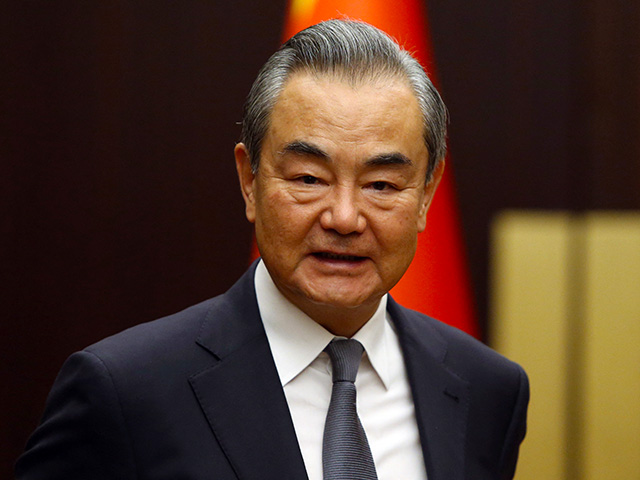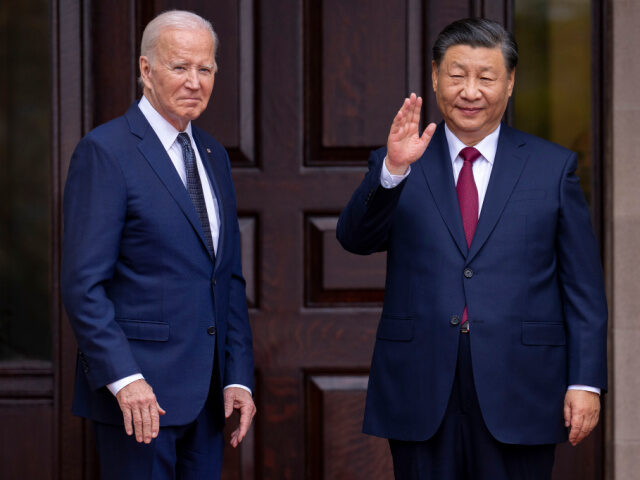Chinese Foreign Minister Wang Yi hosted a one-and-a-half-hour press conference on Thursday in which he outlined what he described as his country’s top foreign policy concerns, among them the claim that America is “obsessed with suppressing China” and needs to protect its “credibility” by maintaining China-friendly policies.
Wang was speaking on the ongoing occasion of the annual “two sessions,” in which China’s national legislative bodies, the National People’s Congress (NPC) and the Chinese People’s Political Consultative Conference (CPPCC), meet to advance the goals of the Chinese Communist Party (CCP). The NPC is the most powerful legislative body in the country, a rubber-stamp entity fully controlled by dictator Xi Jinping. The CPPCC is an “advisory” body, meaning it has no power to enact law, and it often serves as a place for regime-friendly elites to obtain a political position while having to put little to no effort into governing. Xi has allowed multiple individuals with ties to organized crime to hold seats in the CPPCC.
Wang is China’s most powerful diplomat, holding both the foreign minister position and the director of the Chinese Communist Party Central Committee Foreign Affairs Commission Office. Wang obtained the foreign minister seat after the mysterious purging of his predecessor Qin Gang in the summer of 2023.

Wang Yi (-/POOL/AFP via Getty Images)
The foreign minister’s extensive press conference touched on several sensitive issues, including the ongoing threat of radical Islamic terrorism against Israel, Russia’s invasion of neighboring Ukraine, and China’s false claims of sovereignty over the nation of Taiwan. Wang dedicated a significant percentage of his remarks to the relationship with America, however, asserting that “peaceful coexistence is the baseline” and that Washington needed to do more to embrace “win-win cooperation.”
“Mutual respect is the precondition, because interaction sustains only when differences in social and political systems are respected and acknowledged,” Wang Yi said, according to a translation by the Foreign Ministry. While granting that “some improvement” in bilateral ties had occurred since dictator Xi Jinping met with American President Joe Biden in California in November, Wang blamed “U.S. misperception toward China” for stunting the potential friendship between the two countries.
“The U.S. has been devising various tactics to suppress China and kept lengthening its unilateral sanctions list, reaching bewildering levels of unfathomable absurdity,” Wang complained, suggesting America would soon lose “credibility” as a world power:
If the U.S. says one thing and does another, where is its credibility as a major country? If it gets jittery whenever it hears the word “China,” where is its confidence as a major country? If it only wants itself to prosper but denies other countries’ legitimate development, where is international fairness? If it persistently monopolizes the high end of the value chain and keeps China at the low end, where is fairness in competition?
“The challenge for the U.S. comes from itself, not from China. If the U.S. is obsessed with suppressing China, it will eventually harm itself,” Wang concluded. “We urge the U.S. to be clear-eyed about the trend of the times, view China’s development objectively and rationally, engage in exchanges with China proactively and pragmatically, and act to fulfill its commitments.”
The foreign minister did not specify what kind of “harm” America would do to itself if it chose to address China’s long list of human rights abuses, intellectual property theft violations, and national security threats posed to America, among other problematic issues. Nor did he mention the legitimate grievances that the United States has levied against China, such as the discovery of Chinese “police stations” operating illegally on U.S. soil, used to persecute anti-communist dissidents in America; the pervasive negative influence of China’s Tiktok on American society; China’s role in the ongoing fentanyl crisis; and the invasion by a Chinese espionage balloon of U.S. territory in 2023.
RELATED — “That Is NOT the Moon!” Montana Resident Spots Suspected Chinese Surveillance Balloon
Video Source: Leland Wells / LOCAL NEWS X /TMXThe Chinese state propaganda newspaper Global Times credited Wang for placing the blame for any discord between America and China squarely on Washington’s feet.
“Many of the disputes in existing international affairs are related to the US’ incorrect foreign perceptions,” one of the Global Times‘s usual “expert” commentators, Li Haidong, told the outlet.
Biden did not rebut the accusations from Wang during Thursday night’s State of the Union address. His brief mention of China included a nod, however, to wanting to avoid “conflict” with China, with minimal substance as to a future policy towards America’s most formidable national security threat.
“We’re standing up against China’s unfair economic practices. And standing up for peace and stability across the Taiwan Strait. I’ve revitalized our partnerships and alliances in the Pacific. I’ve made sure that the most advanced American technologies can’t be used in China’s weapons,” Biden claimed, without elaborating. “We want competition with China, but not conflict. And we’re in a stronger position to win the competition for the 21st Century against China or anyone else for that matter.”
The Chinese Foreign Ministry declared itself “happy to see a confident and open US enjoying prosperity” in response to a question about the State of the Union address during its regular press briefing on Friday.
“The US needs to work with China in the same direction, find a right way for major countries to get along well with each other, and advance the steady, sound and sustainable growth of the bilateral relations,” spokeswoman Mao Ning demanded.

COMMENTS
Please let us know if you're having issues with commenting.